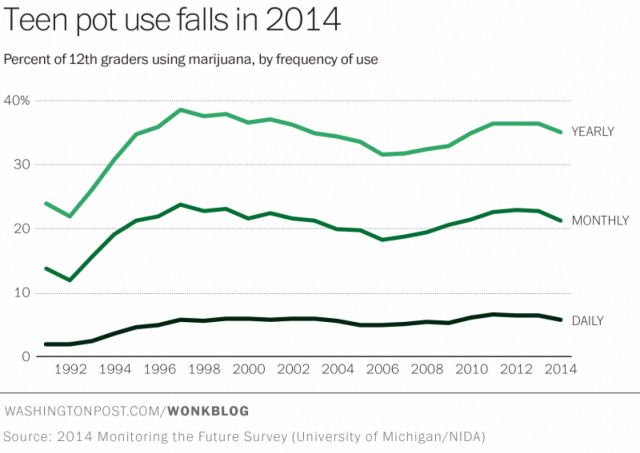So what, who cares (vol 1, issue 66) Why 2015 will be the year of the pot-trepreneur
Hello and welcome to day two of "The Carol of the Bells: Heavenly tune or infernal Christmas horror?" The public opinion seems to be running 3:1 against the carol, but there are qualifiers in there like "Only the instrumental version is vile" and "Only versions sung by choirs are vile." There's still time to share the conditions under which you love or loathe this tune -- hit me up via email or Twitter.
On a related note: Please enjoy one of my favorite Dana Carvey moments, courtesy of "The Dysfunctional Family Christmas." (It's at 2:01, for those of you who can't watch the whole thing.)
*
The most recent U.S. Congress has ended the federal government's ban on medical marijuana, which is good news for 32 states and the District of Columbia. This means no more federal raids on medical pot dispensaries for real and for true. Last year, the DOJ had promised to step off on enforcing the federal anti-pot policies and this provision moves the needle from "We will not actively prosecute anyone" to "We can no longer actively prosecute anyone."

So what? Pot advocacy is no longer the province of aging hippies and that kid on your residence hall who wore a different tie-dyed Bob Marley shirt every day: the provision made it through this Congress because the G.O.P. is framing marijuana growth and use as a states-rights issue. This repositioning just made American politics more interesting: The American electorate is already moving away from the notion that governments should give marijuana the Prohibition treatment, so it will be fun to see which party becomes the bigger friend to the pot industry. It's not a long stretch from medicinal marijuana to recreational marijuana.
Who cares? Obviously, the biggest stakeholders here are the people who can now legally partake.
But there's another invested group: people who are wondering, "Won't someone think of the children?" Several anti-marijuana advocates claim that legalizing marijuana in any capacity will exacerbate teen substance abuse.
When California decriminalized marijuana in 2011, the state found that teenagers did not succumb to reefer madness. In fact, they did the opposite: high school drop-out rates decreased, as did overdose rates and teen arrest rates. Let us also not forge that we are dealing with teenagers here, so if something is legal, it is automatically less fun: a study released this month shows that teen marijuana use is down slightly from 2012. As the Washington Post noted:
In the early 1990s the federal drug war was in full swing. But teen marijuana use spiked sharply during that period. It didn't start falling until the late '90s, when the first states began implementing medical marijuana laws.
This isn't to say that repealing harsh marijuana laws will necessarily cause teen use to trend downward. But it does at the very least illustrate that it's impossible to draw a straight line from "relaxing marijuana laws" to "increased teen use,"
It is, however, possible to draw a straight line from "legalized medical marijuana" to "lower rates of painkiller abuse and overdoses." You know, just in case anyone thought adult lives and their outcomes had as much merit as the children.
Other people who are keenly interested in the outcome of our shifting societal, legal and political attitudes toward marijuana: People who want to make money. Legal marijuana is currently a $1.5 billion industry in the U.S. and it's expected to triple in the next few years. Investors want in on the action. And now is a perfect time to do it: although it's now legal, banks are still skittish about funding operations, so private investors could bankroll a large-scale farm, then reap the rewards. Silicon Valley investor Peter Thiel has just sunk a few million into a cannabis start-up, Privateer, that has a valuation of $425 million. And there are already companies plotting to turn their brand of cannabis into "the Marlboro of Marijuana." It'll be interesting to see where the marijuana jobs and money are this time next year.
*

Your holiday pop-culture note of the day: This came to me courtesy of my pal Allison, a gifted musician who has very strong opinions on holiday music. It's a cover of "The First Noel" by XING, a now-defunct K-pop group, that has a somewhat ... amorous interpretation you must see to believe. There are no fewer than ten people in the group and even after watching the video six times, I can only figure out the roles of five of them.
And once you're done with that, please check out Hari Won's version of "Jingle Bells," as it features people who are so much cooler than any of us will ever be, there is an epic rap about Santa in the middle, and it ends with a dance explosion the likes of which we have not seen since the Peanuts characters' dance in A Charlie Brown Christmas.
*
Did you miss an issue of So What, Who Cares? The archive is here.
As always, I welcome your feedback and suggestions via email or Twitter. Always let me know what you think about So What, Who Cares? If you really like it, tell a friend to subscribe.


